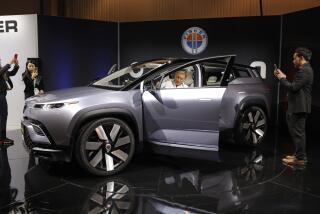Fiat and Chrysler sign alliance plan
- Share via
By taking a stake in Chrysler, Fiat may be providing a glimpse of the future of the auto industry, one that’s a lot more global -- and where everybody scratches each other’s back.
The deal, announced as a letter of intent Tuesday, is not final but would give the Italian automaker a 35% stake in Chrysler, as well as access to Chrysler’s U.S. manufacturing facilities and huge distribution network.
In exchange, Chrysler would be able to sell its larger vehicles in Fiat’s international dealerships and to add much-needed small, fuel-efficient cars to its fleet using Fiat’s small engine and transmission technology.
As such, it’s a partnership that could, in theory, lead to Italian-engineered, U.S.-built Fiats being sold as Dodges at a dealership near you, and Mexican-made Dodges sold as Fiats in France.
“I would love to sell Alfa Romeos or Fiats or Fiats badged as Dodges,” said Jon Gray, owner of Orange Coast Chrysler Jeep Dodge in Costa Mesa.
The partnership is the leading example of the business model du jour in the auto industry, one in which companies trade their strengths with competitors to cover their own weaknesses in the hope that both come out stronger.
“Maybe the future for the industry consists in a series of alliances,” said Thomas Klier, who, as a senior economist at the Federal Reserve Bank of Chicago, has studied the auto business for 15 years. “It has potential, but will they be able to pull it off?”
Other companies, including India’s Tata Motors and Japan’s Nissan Motor Co., have dipped their toes into this collaborative way of doing business. But the linkup between Fiat and Chrysler could be a crucial test of the viability of such deals because it is so ambitious. If it fails, it could further deepen the divide between niche carmakers like Fiat and global giants like Toyota Motor Corp. and Ford Motor Co.
Chrysler may have little choice. The automaker and its lending arm, Chrysler Financial, already have borrowed $5.5 billion from the federal government and are likely to seek more aid when they return to Washington in March.
By making Fiat an offer it couldn’t refuse -- a 35% stake without paying a penny -- Chrysler hopes to address its most glaring problems: a lack of fuel-efficient compact and subcompact cars and an underutilized manufacturing and sales infrastructure.
It also could provide Chrysler, which sells more than 90% of its vehicles in North America, a chance to sell more cars overseas.
“This transaction will enable Chrysler to offer a broader competitive lineup of vehicles for our dealers and customers that meet emissions and fuel-efficiency standards,” Chrysler Chairman Robert Nardelli said.
Fiat, meanwhile, has been angling to bring its high-end Alfa Romeos to the U.S., and the deal lets it avoid paying to develop an expensive dealership network. Instead, it can put its vehicles on Chrysler-franchised lots.
“This initiative represents a key milestone in the rapidly changing landscape of the automotive sector,” said Sergio Marchionne, chief executive of Fiat. “This agreement will offer both companies opportunities to gain access to the most relevant automotive markets.”
Chrysler and other automakers have attempted scaled-down versions of these partnerships in the past. Chrysler builds minivans for Germany’s Volkswagen in Canada, for example, and Fiat has sold its motors to other car companies for years. General Motors Corp. and Toyota share a plant in Fremont, Calif., that makes the Toyota Matrix and Pontiac Vibe, which then compete in the marketplace.
Just last year, Chrysler announced a partnership with Nissan to trade its full-sized pickups for the Japanese automaker’s compact cars. That would allow Nissan to drop the weak-selling Titan pickup and save Chrysler from having to develop a small-car platform.
That deal is in the works, with a Nissan-built Dodge Hornet the most likely product. Meanwhile, Nissan already has begun building a small car, based on its Versa, for Chrysler to sell in Latin America. Chrysler also discussed a deal with Chery, a Chinese automaker, to build a small car for the U.S. market, but that project has fizzled, according to individuals with knowledge of Chrysler’s operations.
Also last year, Tata purchased Land Rover and Jaguar from Ford, giving the Indian company access to several manufacturing plants and a U.S. and European dealership network. Carlos Ghosn, chief executive of Renault Nissan, has spoken on numerous occasions of building alliance-based relationships as a key to surviving the industry’s depressed sales levels.
Analysts say that the teamwork approach has a lot of potential but carries significant risks.
When Germany’s Daimler purchased Chrysler in 1998 for $36 billion, the companies were expected to profit from each other’s strong points. Instead, Chrysler ended up gutted and listless, and Cerberus Capital Management bought it for just $5 billion in 2007.
Today, Chrysler is in such bad financial shape that Cerberus has made signs that it would be willing to give away its stake in the company. (Daimler still owns 19.9%.)
The Fiat deal “could be the cornerstone of Chrysler’s revitalization plans,” said George Peterson of consulting firm AutoPacific. “But it could be a case of one carmaker taking advantage of the other.”
For Fiat, perhaps the most attractive element of the deal is the huge network of Chrysler dealers. The companies could offer franchises to top dealers to sell cars like Fiat’s Alfa Romeo brand.
“Neither has what the other one does,” auto dealer Gray said. “The whole is greater than the sum of its parts.”
--






